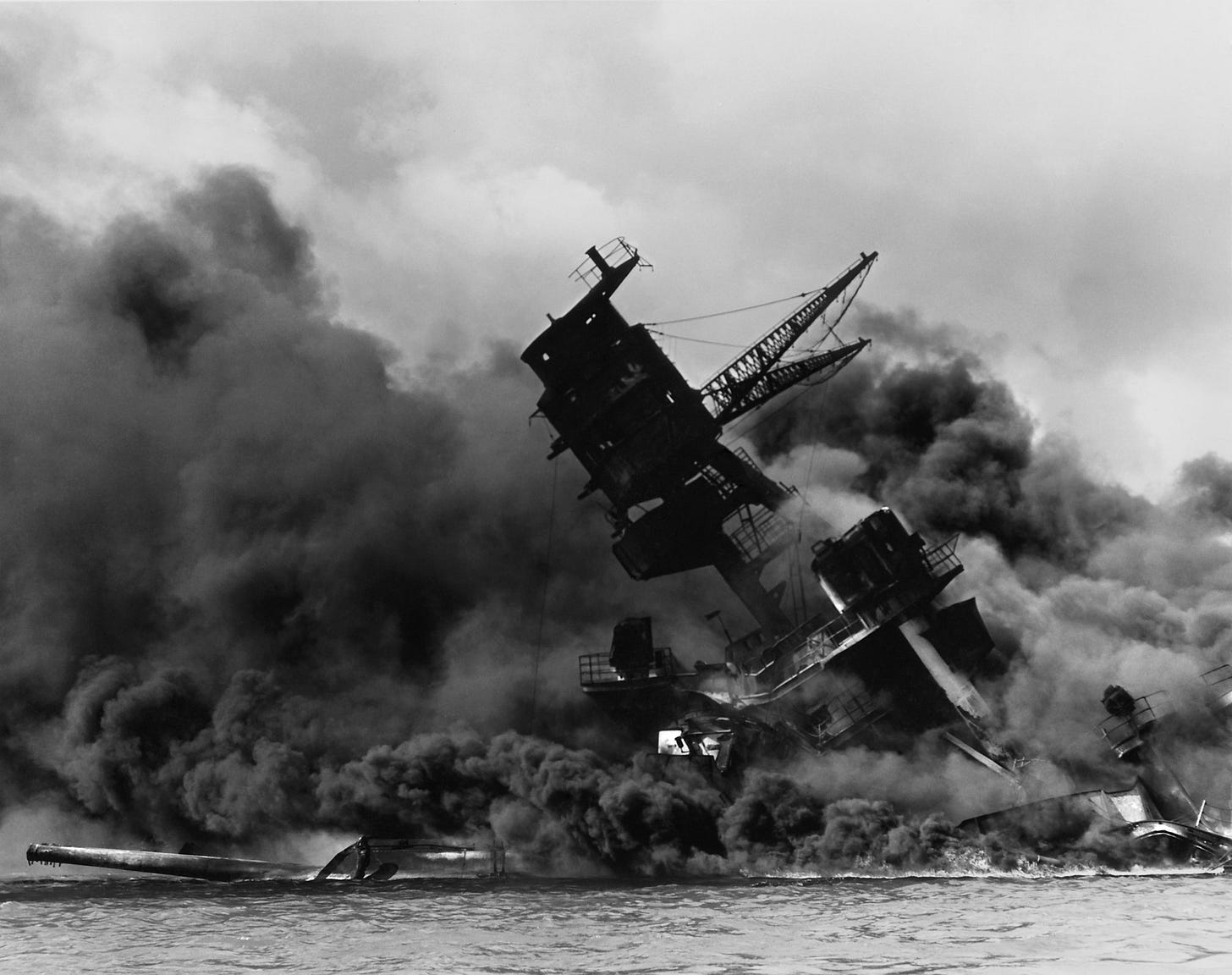December 7th, 1941 》Pearl Harbor Attack
On This Day in History: A Day that Awakened a Slumbering Giant
On a frosty December morning in 1986, nestled in the heart of Michigan, in a quaint one-room schoolhouse brimming with the eager minds of fifty students, a defining moment etched itself into my memory.
I, an 8-year-old, lounged in my seat, ready for the customary classroom routine, but that day was destined to be anything but ordinary. As Mrs. Jones, our teacher, wheeled in the old TV on its creaky cart, with the VCR player balanced precariously atop, a flicker of excitement coursed through me. "Movie time," I thought, "perfect for a quick nap in the dark."
But as the lights dimmed, and the hum of the TV filled the air, what unfolded on the screen was far from a lullaby. It was a story of a day that lived in infamy, a day that awakened not just a nation but the consciousness of a young mind – my mind. December 7, 1941, the day Pearl Harbor was attacked.

I watched, riveted, as black-and-white footage rolled, depicting a serene Hawaiian morning shattered by the deafening roar of Japanese Zero planes. The images were stark, jarring – billowing smoke, sinking battleships, and the chaos of unprepared American soldiers scrambling amidst the unexpected onslaught. The Pacific paradise was transformed into a hellish inferno, a stark reminder of the brutality lurking just over the horizon of human intent.
In that dim classroom, amidst peers who were equally mesmerized, a realization dawned on me. Humans, in their quest for power and domination, were capable of senseless devastation. The attack on Pearl Harbor was not just a military strike; it was a manifestation of a world where the might of 'penis rockets,' as we cheekily called them, dictated the rules of engagement. It was a game of chess played by global superpowers, where strategic positions like Pearl Harbor were pawns on a board too vast for us to comprehend fully.
As the documentary narrated the events leading up to the attack, I couldn't help but reflect on the irony. Here was Hawaii, a place synonymous with vacation and escape, a tropical utopia where worries seemed worlds away. Yet, it became the epicenter of a brutal wake-up call, a reminder that no place, no matter how idyllic, was immune to the world's tumult.
The attack's aftermath was a testament to American resilience. A nation, once slumbering in the illusion of isolation, was jolted awake, galvanized into action. It was a turning point in World War II, a moment when America shed its reluctance and stepped onto the global stage with a newfound resolve.
That day in the classroom, as the lights flickered back on, I felt a compelling shift within me. The nap I had so eagerly anticipated was forgotten, replaced by a torrent of emotions - anger, sadness, but above all, a deep sense of sobriety about the complexities of the world stage.
Pearl Harbor was more than a historical event; it was a harsh lesson in the realities of war, power, and the human capacity for destruction. It was a narrative of loss and awakening, a stark illustration of a world grappling for power, where paradises like Hawaii were not escapes but frontlines.
As I walked out of that schoolhouse, the cold Michigan air felt different, as if I was breathing in a new understanding of the world. Pearl Harbor, in its tragic grandeur, was not just a tale of a bygone era; it was a reminder of the ongoing struggle between peace and conflict, a cautionary tale of what happens when nations, driven by the desire for dominance, forget the human cost of their ambitions.
In the years that followed, that December day in the classroom remained a pivotal point in my life. It shaped my understanding of global dynamics, the delicate balance of power, and the ever-present shadow of conflict. It was a history lesson that transcended textbooks, a narrative that unfolded in the minds of fifty students in a small Michigan town, leaving an indelible mark on at least one of them – me.

